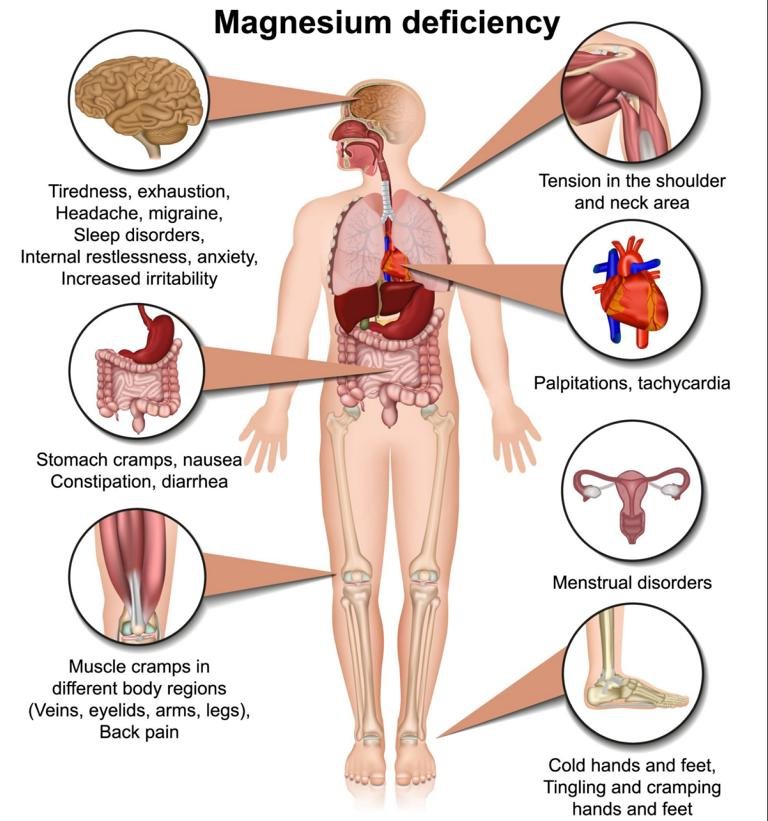Table of Contents
Learn about the first signs of magnesium deficiency and why this essential mineral is crucial for your health. Discover symptoms like fatigue and muscle cramps, and how to prevent deficiency with Dr. Berg’s insights.
Magnesium plays a critical role in maintaining health, and awareness of its benefits and the signs of deficiency can empower individuals to take proactive steps towards optimal wellbeing. Adjustments to diet and lifestyle, supplemented with professional medical advice, can effectively manage and prevent magnesium deficiency.
Magnesium deficiency
I’d like to discuss the first sign of a magnesium deficiency .
Did you realize that 68% of people in the United States don’t get the required amounts of magnesium from their diet .
Now , not to mention all the other foods and things and drugs and things that people are exposed to that deplete magnesium .
What is magnesium?

Magnesium is a cofactor involved in 350 different enzymes .
What’s a cofactor ?
A cofactor is something that is required by an enzyme for that enzyme to work .
And I’m not just talking about digestive enzymes .
I’m talking about enzymes that make up all your biochemistry that do all the bodily functions .
The other thing about a magnesium deficiency is many times a potassium deficiency has very similar symptoms .
So it’s it’s it is difficult to determine if you have a magnesium deficiency or a potassium deficiency .
But the good news is they both come from vegetables and salads .
So as long as you already know those , you’re gonna be totally fine .
Magnesium deficiency symptoms

But before I get into the number one most common symptom , let me go through some other symptoms
Cramping , twitching , which could also come from other things as well , like your pH being too alkaline .
Arrhythmias , okay , of the heart .
The heart starts skipping because of a lack of magnesium mainly because magnesium works with calcium .
Magnesium helps remove too much calcium from the cell , helping this over contracted vasoconstricted artery , lowering your blood pressure .
Now as far as your bone health , people think calcium to prevent osteoporosis , but magnesium is just as important .
And Osteomalacia , which is a vitamin d deficiency , which is softening of the bones in adults , like a child’s version would be rickets , because magnesium is essential for vitamin d activation .
You can’t activate vitamin d without magnesium .
Insulin resistance , and I’ve talked about this in many other videos , has a related magnesium deficiency usually .
And this is why when you increase magnesium , you start to make insulin more sensitive , and it starts to work .

And of course , insomnia .
If you don’t have enough , you’ll have a tendency to not being able to sleep .
And also low magnesium can raise cortisol .
And of course , your mood , is dependent on magnesium . Too .
If you’re deficient in magnesium , you may find that you’re a bit on the depressed side .
The first sign of magnesium deficiency
So what is the number one symptom of a magnesium deficiency ?

It is fatigue .
Now so many people have fatigue , and maybe you right now are sitting right there and you’re tired .
A lot of people are tired .
It could be as simple as not getting enough magnesium .
And I do want to mention what foods to eat for Magnesium because that’s ultimately the best way to get your Magnesium .
Why you need magnesium
But let me just dive into why people get tired because they don’t have enough magnesium .
Remember I mentioned that magnesium is necessary for 350 different enzymes ?
Well , a lot of those enzymes are in the mitochondria , and specifically the creation of ATP .
ATP is the energy currency that the body uses to power all the different functions .
And magnesium powers something else that I talked about in other videos , the sodium potassium pumps .
These are the little pumps in every single cell that power your muscles to work and your nervous system to work .
That little pump creates the voltage because your cells are like batteries .
Well , guess what ?
Magnesium provides the energy to allow for that pump to pump .

So this is why you might have cramps .
There’s just not enough power to allow that sodium potassium pump to work in the muscles , and things start shutting down and you cramp .
This is why the electricity cannot be traveled through the pacemaker of your heart correctly .
And if that can’t work , you start getting arrhythmias or palpitations , or your heart starts to skip because you don’t have the energy because there’s no magnesium to power that sodium potassium pump in the nervous system .
Magnesium is also needed to make proteins , protein synthesis .
Also needed to make DNA and RNA , the building blocks of everything .
Now most people are deficient because they’re just not eating enough of the right food to prevent this problem .
The best sources of magnesium
And the food that will give you the most magnesium is leafy greens , vegetables , big salads .
The cool thing , it will also give you the potassium .

So when you eat foods , whether at a restaurant or at home , and you have this little side salad that’s just like 1 cup , it’s just not gonna be enough .
You need to beef up your salads , no pun intended , to the point where if you’re doing , like , 2 meals a day , I would say , you know , have , like , 5 cups , or just get it out of the way and eat , like , 7 cups of salad just one time a day .
Now , ideally , if you go a little bit more , it’s a little bit better , but I think you should work on a nice gradual increase in your salad .
But the point is that most people don’t consume enough salad .
Even associates , friends , family members , around myself , I see what they’re eating , and they just don’t have enough salad .

So when I go to a social activity and they bring out the meals , right , they have a big salad bowl , and you’ll put your salad on the plate with all the other food .
Now you need an extra bowl in addition to your plate to put that huge salad .
Of course , I’m usually the only one that does that in , my circles , But the point is that I don’t have any arrhythmias .
I don’t get any cramps .
I have tons of energy because I have enough magnesium .
If you don’t do that or can’t do that , well , definitely start using a supplement .
I would recommend magnesium glycinate .
It’s a good one .
But there’s 3 types of magnesium I would not recommend .
Magnesium supplements to avoid
The , magnesium oxide , the magnesium hydroxide , and the magnesium carbonate .
Those might be okay maybe as a laxative , but other than that , I wouldn’t take them because they’re not very absorbable .
Other causes of magnesium deficiency
The other ways that people are deficient are , they eat too many refined foods , especially fructose , which is in table sugars and honey .
It’s in high fructose corn syrup .
It’s in a lot of other things as well .
But fructose can deplete magnesium .

Alcohol .
And what is alcohol made from ? Sugar .
The more inflammation you have , the less magnesium you’re gonna have in your body .
If you wanna know a good biomarker on a blood test for a magnesium deficiency , look at something called c reactive protein .
That’s an inflammatory biomarker , and it usually means that you need more magnesium .
Also , certain medications , like especially diuretics , can create a magnesium deficiency , as well as antibiotics .
When you have this alteration in your microbiome , probably from a combination of several things , what happens is there’s a certain thing that will start binding up and locking up a lot of the magnesium .
And , a lot of people start developing musculoskeletal issues like fibromyalgia , painful trigger points , a lot of muscular problems .
Because you need magnesium for that normal relaxation phase of the contraction and relaxation cycle .
key Points:
Magnesium is a cofactor involved in 350 enzymes. A cofactor is something that is required by an enzyme to work.
Symptoms of magnesium deficiency:
• Cramping
• Twitching
• Arrhythmia
• Osteoporosis
• Osteomalacia
• Insulin resistance
• Insomnia
• High cortisol
• Depression
- However, the number one symptom of magnesium deficiency is fatigue.
- The top cause of low magnesium is not consuming enough magnesium in the diet. Foods rich in magnesium are vegetables and leafy greens.
- Consuming large salads is a great way to get the magnesium you need. But you can also take a magnesium supplement. If you do take a supplement, consider magnesium glycinate.
Other causes of magnesium deficiency:
- Refined foods
- Fructose
- Alcohol
- Certain medications
DATA:
Get my FREE PDF Guide on Magnesium 👉 Guide on Magnesium
https://www.nature.com/articles/srep42377
FAQ:
How do you feel when you start taking magnesium?
Upon starting magnesium supplementation, many individuals notice an improvement in sleep quality, a decrease in stress and anxiety levels, and fewer muscle cramps. Magnesium aids in relaxation, so a general sense of calm and wellbeing is often reported.
Does magnesium take effect right away?
The immediate effects of magnesium depend on the individual and their deficiency level. Some people may notice improvements in symptoms like muscle cramps and sleep quality within a few days, while other benefits, like enhanced mood and decreased anxiety, can take several weeks to become apparent.
How to test for magnesium deficiency at home?
While home testing kits are available, the most accurate way to test for magnesium deficiency involves a blood test ordered by a healthcare professional. However, evaluating dietary intake and symptom assessment can also provide valuable clues to a potential deficiency.
How long does it take to correct a magnesium deficiency?
Correcting a magnesium deficiency typically takes about one month, but the exact timeframe can vary based on the severity of the deficiency and individual factors like absorption rates and dietary intake.
11 warning signs of magnesium deficiency
- Muscle twitches and cramps
- Mental disorders such as depression and anxiety
- Osteoporosis
- Fatigue and muscle weakness
- High blood pressure
- Asthma
- Irregular heart rhythms
- Sleep disorders
- Headaches and migraines
- Constipation
- Numbness and tingling
Magnesium deficiency symptoms in females
In females, magnesium deficiency may manifest as hormonal imbalances, leading to symptoms like severe premenstrual syndrome (PMS), menstrual cramps, anxiety during the menstrual cycle, and migraines.
Weird magnesium deficiency symptoms
Some less common or “weird” symptoms of magnesium deficiency include a craving for salt or chocolate, personality changes, noise sensitivity, and abnormal heart sensations like skipped beats or palpitations.
Magnesium deficiency treatment
Magnesium deficiency is generally treated by increasing dietary intake of magnesium-rich foods (like leafy greens, nuts, seeds, and whole grains) or through supplements under the guidance of a healthcare provider. The form and dosage of magnesium will depend on the severity of the deficiency and individual health needs.
Magnesium deficiency skin
Symptoms related to magnesium deficiency that may appear on the skin include dryness, reduced skin elasticity, and more frequent outbreaks of acne and other skin conditions due to the body’s impaired ability to fight off bacteria and inflammation.
Can low magnesium kill you?
While extremely rare, severe magnesium deficiency can lead to life-threatening complications, such as cardiac arrest due to the essential role of magnesium in heart rhythm regulation. However, such cases are uncommon and typically involve other underlying health issues.
How long to correct magnesium deficiency
Generally, it takes about one month to correct a magnesium deficiency, although significant improvements in symptoms can often be seen within weeks of starting supplementation.
Magnesium deficiency causes
Causes of magnesium deficiency include poor dietary intake, chronic alcoholism, gastrointestinal diseases like Crohn’s and celiac disease, type 2 diabetes, prolonged stress, and the use of certain medications such as diuretics and antibiotics that can deplete magnesium levels.




